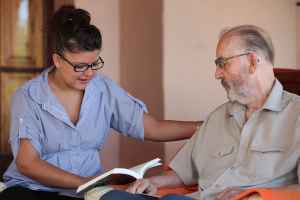Nursing Homes in Wisconsin
Seniors who enjoy living in a state that experiences all four seasons of the year couldn’t do much better than Wisconsin, the Badger State. With a population of 5,822,434 and 17.5% aged at least 65, Wisconsin has a larger than normal senior population. Located in the upper Midwest, Wisconsin does have harsh winters, but it also enjoys cool springs, warm and sometimes hot summers and pleasant autumns. It’s also a friendly state for seniors in terms of living costs, with overall prices on items like housing, groceries and health care averaging 9% less than the national average. Seven communities in the state are members of the AARP Network of Age-Friendly States and Communities, including La Crosse, Madison, Oshkosh and Sheboygan.
As of 2019, Wisconsin’s health care system includes 353 certified nursing facilities. These facilities care for seniors who may have more complicated medical situations and for the disabled. This guide will look at the cost of nursing care in Wisconsin, the rules and regulations that govern it and government programs that help defer the cost of nursing care for seniors.
SeniorAdvice's Guide to Nursing Home Care in Wisconsin
The SeniorScore is designed to provide seniors with an overview of the livability of different states and communities around the country. It comprises 100 data points gathered from government and private databases and broken down into an overall score and four different categories: Health & Safety, Recreation & Leisure, Finances and General Quality of Life. Wisconsin has a good overall SeniorScore of 71, which is near the national average of 72.
Wisconsin’s highest mark came in Health & Safety with a 67. Seniors will find a high number of Medicare-registered health care providers and many hospitals in the state. The average life span in Wisconsin is 80, which is about a year and a half better than the national average.
Wisconsin’s remaining marks bunched together in the 62/63 range. Wisconsin recorded 63 in General Quality of Life. Much of that has to do with the weather in the state. It rains less frequently in Wisconsin than in other states, and Wisconsin enjoys average high and low annual temperatures. It can get as high as 81°F in the summer and as low as 7°F in the winter. Wisconsin is a large state with only about 540 people per square mile.
Recreation & Leisure and Finances are tied with a 62. Wisconsin has 473 golf courses and an average number of municipal parks. On the Finances side, the average sales tax in Wisconsin is significantly lower than the national average, although the state income tax is higher. Both the mean and median household income averages in Wisconsin are higher than the national average.
Top Nursing Care in Wisconsin
Maple Ridge Health and Rehabilitation is a 74 bed nursing home facility situated in the Gra-Ram neighborhood of Milwaukee, Wisconsin. The facility is in a generally middle class area, with an average per-household income of $49,337. With roughly ...
Sunrise Care Center is located in the Alverno area of Milwaukee, Wisconsin. It is a 99 unit senior care facility. The facility is in a mostly middle income area, with a median family income of $47,353. With ...
Eden Rehabilitation Suites is located at 3151 Eden Ct in Oshkosh, Wisconsin. It is a 50 bed skilled nursing facility. With approximately 22,000 people residing in the zip code of 54904, the encompassing area is densely populated. ...
Southpointe Healthcare Center is a 174 room nursing home facility located in the Honey Creek Manor neighborhood of Greenfield, Wisconsin. With an average per-family income of $47,353, the facility is in a mostly middle class area. It is ...
Meadowmere & Mitchell Manor West Allis is a senior care community located within the White Manor area of West Allis, Wisconsin. The facility is in a predominantly middle class area, with a median per-family income of $47,285. ...
Alexian Village of Milwaukee is a 108 room senior care facility situated within the Northridge Lakes area of Milwaukee, Wisconsin. The community is in a primarily middle class area, with an average household income of $46,650. It is ...
Karmenta Center is a 105 room senior care community. It is located within the Heistand neighborhood of Madison, Wisconsin. The surrounding area has an average population density, with roughly 17,000 individuals living in the 53714 zip code. ...
Lasata Senior Living Campus is a 150 unit senior care community. It is located at W76 N677 Wauwatosa Rd in Cedarburg, Wisconsin. With roughly 19,000 individuals living in the 53012 zip code, the surrounding area has an average ...
Situated in the Muskego Way neighborhood of Milwaukee, Wisconsin, Mercy Residential and Rehabilitation is a 60 bed nursing home facility. The community is in a mostly working class area, with a median per-household income of $34,884. With about ...
Located at 1050 Division St in Mauston, Wisconsin, Fair View Nursing Home is a 60 unit nursing facility. The facility is in a largely middle class area, with a median per-family income of $45,725. It has an average ...
Located at 1119 N Wisconsin St in Port Washington, Wisconsin, Heritage Nursing and Rehabilitation is a 74 unit skilled nursing facility. With a median per-family income of $59,660, the facility is in a primarily middle income area. It ...
Water's Edge is located at 11040 North State Rd 77 in Hayward, Wisconsin. It is a 50 bed senior housing facility. The surrounding area has an average population density, with about 12,000 residents in the 54843 zip code. ...
Door County Medical Center SNF is located at 323 S 18th Ave in Sturgeon Bay, Wisconsin. It is a 22 bed senior community. The community is in a generally middle income area, with an average family income of ...
Located at W173 N10915 Bernies Way in Germantown, Wisconsin, Virginia Highlands Health and Rehabilitation Center is a 121 room nursing home facility. With approximately 20,000 individuals living in the zip code of 53022, the encompassing area has an ...
Lakeland Health Care Center is located at 1922 Cty Rd Nn in Elkhorn, Wisconsin. It is a 120 room nursing home facility. The community is in a primarily middle class area, with a median per-family income of $60,059. ...
Sheboygan Progressive Care Center is a 120 bed senior care facility. It is located at 1902 Mead Ave in Sheboygan, Wisconsin. The community is in a generally middle class area, with a median household income of $43,459. ...
Situated in the Fair Park area of West Allis, Wisconsin, Allis Care Center is a 152 bed senior care facility. The community is in a primarily middle income area, with a median household income of $45,041. With around ...
Manitowoc Health and Rehabilitation Center is a 150 unit skilled nursing facility. It is located at 2021 S Alverno Rd in Manitowoc, Wisconsin. With an average per-family income of $46,416, the community is in a primarily middle income ...
Oakridge Gardens Memory Center is a 94 bed senior care community. It is located at 1700 Midway Rd in Menasha, Wisconsin. The encompassing area is densely populated, with around 27,000 individuals residing in the zip code of 54952. ...
VMP Trinity is an 87 bed senior housing community situated within the Whispering Hills neighborhood of Milwaukee, Wisconsin. The surrounding area is densely populated, with approximately 30,000 poeple living in the zip code of 53223. With a median ...
The Cost of Nursing Home Care in Wisconsin
The cost of nursing home care in Wisconsin of $8,684 a month is high but only about $900 a month higher than the national average of $7,756 a month. Compared to the cost of nursing care in nearby states, Wisconsin falls in the middle. Michigan has the highest cost at $11,026 a month, while Michigan is about $300 more a month than Wisconsin at $8,973 month. The lowest costs are in Iowa at $6,570 a month and Illinois at $6,235.
- Wisconsin: $8,684
- National: $7,756
- Minnesota: $11,026
- Michigan: $8,973
- Iowa: $6,570
- Illinois: $6,235
The Cost of Nursing Home Care in Wisconsin’s Top Cities
The cost of nursing home care in Wisconsin cities averages from about $8,100 a month to about $9,600 a month. Janesville is the most expensive at $9,612, while Milwaukee is next at $9,429 a month. Racine at $9,277 and Oshkosh at $9,262 are separated by $15 a month. Sheboygan, located on Lake Michigan, costs $8,790 while La Crosse, which is close to the border with Minnesota, has the lowest average monthly cost of $8,144.
- Janesville: $9,612
- Milwaukee: $9,429
- Racine: $9,277
- Oshkosh: $9,262
- Sheboygan: $8,790
- La Cross: $8,144
Senior Care Cost Comparison in Wisconsin
Nursing home care in a semiprivate room in Wisconsin is still the most expensive option for senior care but it remains competitive. Memory care is $5,500 a month while residing in an assisted living facility is $4,400 a month. The cost of home care and home health care are both $4,957 month, while the least expensive option in Wisconsin is adult day care, which costs $1,322 a month.
- Memory Care: $5,500
- Assisted Living: $4,400
- Home Care: $4,957
- Home Health Care: $4,957
- Adult Day Care: $1,322
- Nursing Care: $8,684
Financial Assistance for Nursing Home Care in Wisconsin
As you can see above, Nursing Home Care is often the most expensive senior care option – sometimes even 2-3 times the cost of other types of senior living. The primary reason for this is the 24/7 skilled nursing and other medical services that are provided. Thankfully, most people aren't forced to pay for skilled nursing care entirely out-of-pocket. Rather, many qualify for financial assistance programs to help cover the cost of nursing care.
Medicaid is the most comprehensive financial assistance program – but, not all seniors are eligible for Medicaid. And because each state operates its own Medicaid program within federal guidelines, eligibility and benefits vary from state to state. Below, we provide more information on Medicaid in Wisconsin.
Medicaid in Wisconsin
A federal/state health insurance program for low-income seniors and children, eligible senior beneficiaries can qualify for financial assistance for skilled nursing facilities under Medicaid. Wisconsin has not expanded Medicaid to include all low-income adults. Currently 1,196,167 individuals in Wisconsin are enrolled in Medicaid or the version for children — CHIP. That’s about 20% of the state’s population. Of that number, 21,246 seniors reside in skilled nursing care. Most of the state’s 353 skilled nursing facilities accept Medicaid.
Medicaid Eligibility in Wisconsin
To be eligible for Medicaid in Wisconsin, seniors need to be meet certain state guidelines on financial and personal means testing as well as other important criteria. Some of these requirements include:
- Applicants must earn no more than 95% of the federal poverty guidelines, which is graded based on the number of individuals which reside in their home. When this number is calculated, wages, pensions and Social Security are used but Social Security income is not.
- Seniors cannot have assets worth more than $2000 for an individual or $3000 for a couple. One home and one car are not included in the asset total, although if seniors have more than one car, this second car is included.
- Applicants need to be residents of Wisconsin.
- Applicants need to be American citizens, permanent residents or legal aliens
- Applicants must be at least 65
- Seniors who apply for Medicaid must pass a needs assessment which will determine whether they meet the requirements for a nursing home level of care.
Seniors can apply for Medicaid on the Wisconsin ACCESS site. Eligible seniors will qualify for coverage that will help them with health care and nursing home costs and for Medicaid waivers. Seniors can find out more about available benefits at Medicaid Programs for Seniors.
Additional Financial Assistance Options
- Medicare: For the first 20 days in a skilled nursing facility, Medicare will cover the entire cost of care, and a portion of the costs up until day 100. After 100 days, Medicare won't cover any of the costs. Importantly, seniors must also have a "qualifying hospital stay" that lasts 3 days prior to their admission to a nursing home in order to qualify for Medicare coverage.
- Aid and Attendance: Aid and Attendance may be available to veterans who receive a VA pension. This benefit is a monthly cash allowance that veterans receive in addition to their standard pension amount. It is intended for veterans in need of long-term care services and may be used to pay for skilled nursing care.
- Reverse Mortgages: For those who own a home, reverse mortgages are loans that one can take out against the value of their home, essentially converting some of the home's equity into cash. It's often a good fit for married couples when only one partner needs nursing care, as the other residents of the home may continue living there. Keep in mind that reverse mortgage loans do need to be repaid (with interest), typically within 12 months of receiving the loan.
- Long-Term Care Insurance: For seniors who already have long-term care insurance, the cost of skilled nursing care may be covered. Most policies cover at least a portion of the costs, but it depends on the specific policy terms. It's important to note that older adults who are already in need of skilled nursing care will not be eligible to sign up for a long-term care insurance policy.
Wisconsin Nursing Home Care Rules and Regulations
The Wisconsin Department of Health Services licenses and regulates nursing facilities in the state. Meanwhile, the Division of Quality Assurance maintains the state’s Nurse Aide Registry and oversees the required training and competency exams. Here are some of the regulations and requirements that nursing homes in Wisconsin must follow:
Scope of Care | Nursing personnel shall provide care that maintains a resident’s current functionality and helps them improve their abilities to carry out the activities of daily living (ADL). Each resident shall be kept clean and well-groomed. The facility will provide 24-hour medical care by employing the appropriate number of staff needed to maintain the residents’ emotional, physical and mental well-being, including a licensed administrator, registered nurses, nurse aides, rehabilitative therapists and either a full-time, part-time or consulting pharmacist. |
Care Planning | Except in the case of a person admitted for short-term care, a written care plan shall be developed within four weeks following the admission of a resident and that plan shall be based on assessments of medical personnel including the resident’s personal physician. This care plan will be reviewed and updated by the appropriate facility staff as needed. |
Pharmacy Services | Each facility shall take the necessary steps to ensure that needed medications for residents are obtained from a licensed pharmacy. A facility can maintain a contingency supply of 10 units of any medication if that medication is under the control of pharmacist. If the drugs cannot be delivered from the pharmacy to the facility by a pharmacist, the physician's agent shall deliver the drugs in locked containers. |
Staff Screening | Every new employee must present in writing certification from a doctor or a physician’s assistant that they have been tested for communicable diseases. Every employee or contractor involved in personal care of residents shall undergo a criminal background check before their employment. |
Staff Training | All new employees, including temporary staff, shall receive appropriate orientation to the facility and its policies within 30 days of their beginning work. All employees involved with direct care shall attend educational programs designed to improve their skills as often as is necessary. Educational program should also be held regularly for dietary staff to ensure the proper handling of food. |
Medicaid Coverage | Most skilled nursing facilities in Wisconsin accept Medicare. Financial assistance to help cover the cost of nursing home care is available to seniors who meet income and asset requirements. Before entering a Wisconsin nursing facility, seniors must complete a needs assessment that shows they require a nursing home level of care. |
Reporting Abuse | Seniors, their families or their caregivers who are concerned about abuse or neglect in their facilities should contact the Long-Term Care Ombudsman at (800) 815-0015. The ombudsman investigates complaints about nursing facilities and ensures the rights of every resident are protected. |
Free Nursing Home Resources in Wisconsin
Wisconsin Community Resources for Seniors
Wisconsin Community Resources for Seniors has prepared a guide that offers information on dozens of available community resources for seniors in Wisconsin. This includes federal and state resources as well as nonprofit programs that are available free of charge. The organization’s goal is to help connect seniors with the best possible health care providers in the state.
SeniorLAW
SeniorLAW provides free legal services for residents of Milwaukee County aged 60 and older. This includes information on available benefits and legal assistance if needed. The service is free of charge, although donations are accepted. SeniorLAW can assist seniors with issues concerning Medicaid, Medicare, long-term care, Social Security and Supplemental Security Income to name a few issues.
Wisconsin Agencies
The Long-Term Care Ombudsman
Address: 1402 Pankratz Street, Suite 111, Madison, WI 53704-4001
Phone Number: (800) 815-0015 or (608) 246-7001
Website: https://www.dhs.wisconsin.gov/aging/ltcombud.htm
The mission of the long-term care ombudsman is to investigate and resolve complaints of abuse or neglect in nursing care facilities around the state. Working with residents, their families and the appropriate agencies, the long-term care ombudsman strives to improve the quality of care provided, protect the rights of residents, ensure their dietary needs are being met, protect residents' privacy and confidentiality and help residents who may have questions about long-term care or power of attorney.
PACE (Program of All-Inclusive Care for the Elderly)
Address: 1 West Wilson Street, Madison, WI 53703
Phone Number: 608-266-1865
Website: https://www.dhs.wisconsin.gov/familycare/pace.htm
The PACE program combines the services provided by Medicare, Wisconsin Medicaid, and long-term care services. Some of the services include hospital and nursing home care, primary health care, emergency services, prescription drugs, dentistry, x-rays, podiatry and medical transportation to name a few services. Most of these services are provided at a PACE center. To join the PACE program, seniors must live in Milwaukee, Racine or Waukesha counties, be 55 or older and eligible for nursing home care.
SeniorCare Prescription Drug Assistance Program
Address: 1 West Wilson Street, Madison, WI 53703
Phone Number: 800-657-2038
Website: https://www.dhs.wisconsin.gov/seniorcare/index.htm
A program designed for eligible Wisconsinites who are aged 65 or older, senior care helps seniors with prescription drug costs. Eligible applicants must be a Wisconsin resident, at least 65 years of age and a US citizen, legal alien or permanent resident. A senior’s annual income will determine their level of coverage in SeniorCare and what portion of their prescription drug costs SeniorCare will cover. Residents can enroll the month of their 65th birthday or any time thereafter and there is an annual $30 fee. Benefits begin the month after making an application.
Area Agencies on Aging in Wisconsin
Wisconsin has three Area Agencies on Aging offices that serve communities in the state. AAA’s offices promote access to programs, facilities and services and advocate for the needs of seniors. This includes counseling on issues concerning health care such as Medicare and Medicaid, providing transportation to medical appointments when needed and helping to feed needy seniors. Aside from their own programs, they work with community groups to help promote the interests of seniors
Veteran Affairs Office in Wisconsin
The Wisconsin Department of Veterans Affairs works with veterans, their families or their survivors to ensure they receive the benefits to which they are entitled. This includes access to the several veterans’ homes in Wisconsin that provide skilled nursing care and memory care. Other benefits include health care aid grants that can be used to help pay for the cost of health care, assistance with housing issues and employment opportunities.
Social Security Offices in Wisconsin
Programs provided by the Social Security Administration (SSA) include Social Security, Social Security disability benefits, Medicare enrollment and Supplemental Security Income (SSI). Seniors, their family makers or their caregivers who want to learn more about these programs can visit one of the SSA offices in Wisconsin. Some programs, such as SSI, provide a monthly stipend to low-income individuals to help defray cost of room and board in a nursing care facility.






















 Your Information is Processing
Your Information is Processing